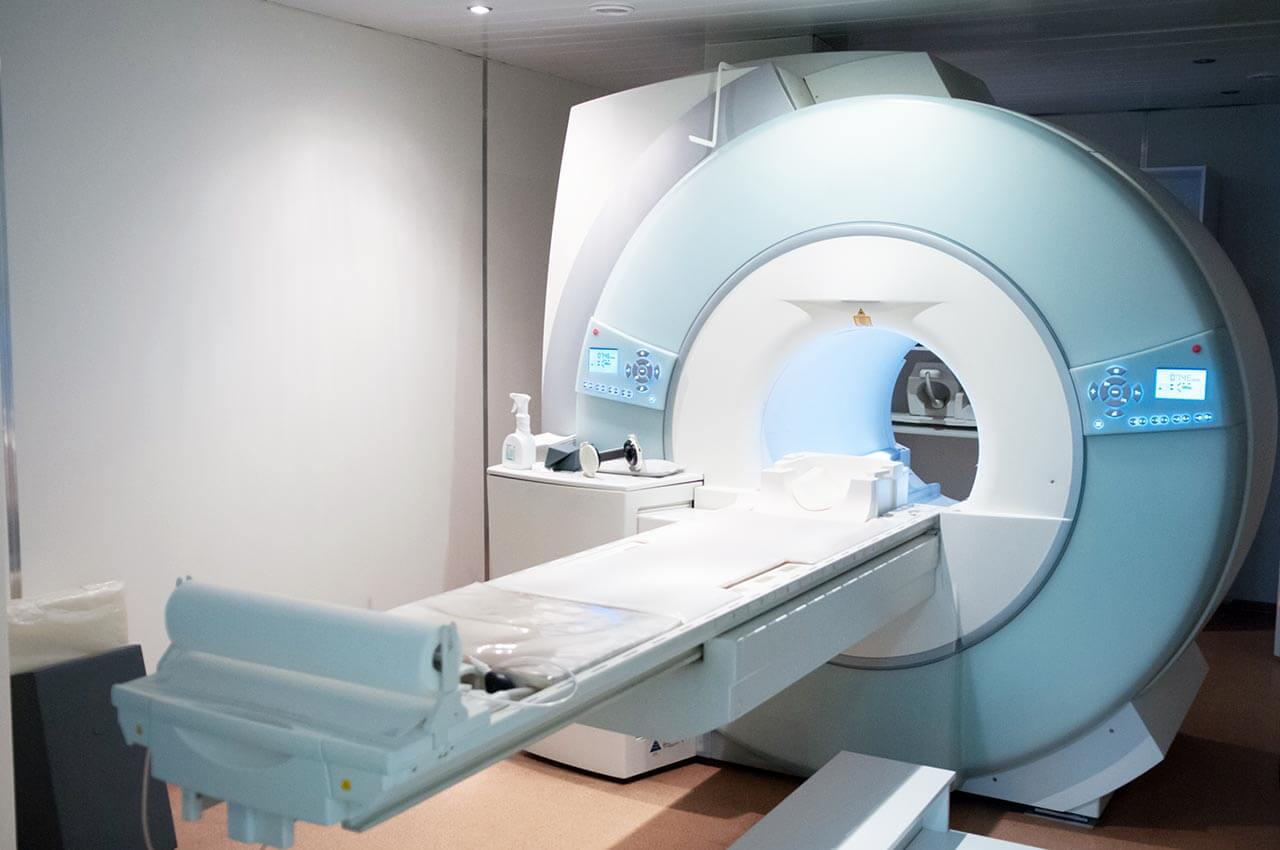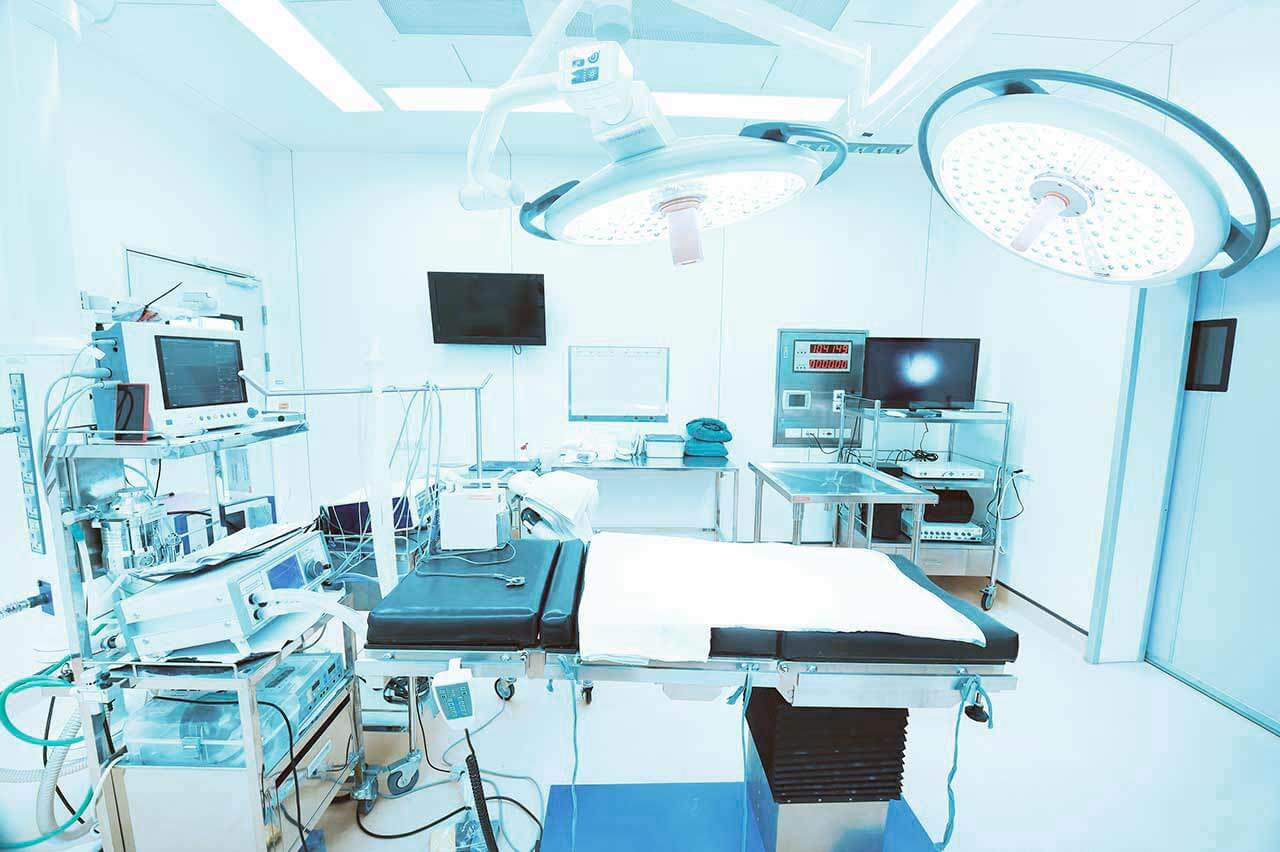
The program includes:
- Initial presentation in the clinic
- clinical history taking
- review of medical records
- physical examination
- laboratory tests:
- complete blood count
- general urine analysis
- biochemical analysis of blood
- inflammation indicators (CRP, ESR)
- TSH-basal, fT3, fT4
- indicators of blood coagulation
- CT planning of radiation therapy
- full course of conventional radiation therapy
- symptomatic treatment
- control examinations
- nursing services
- consultations of related specialists
How program is carried out
During the first visit, the doctor will conduct a clinical examination and go through the results of previous laboratory tests and instrumental examinations. After that, you will undergo an additional examination, including complete blood count, laboratory assessment of liver and kidney function. Based on the received results, the physician will conduct radiotherapy planning with the help of CT or MRI, make the permanent tattoo marks on the skin and conduct CT simulation in order to assess the accuracy of the rays and the radiation dose. If necessary, related medical specialists will be involved in the elaboration of a treatment regimen (tumor board).
Radiation therapy is carried out as the day hospital procedure, without mandatory admission to the hospital. At each visit, the physician will assess your general condition and the marks on the skin. After that, you will be placed in a shielded radiation therapy room, on a special table.
Each radiation therapy session lasts less than half an hour (including preparation). All this time, doctors and nurses are monitoring your condition, you can communicate with them through a loudspeaker. The procedure is completely painless. Depending on the planned course of treatment, you will visit the hospital from 1 to 3-5 times a week.
After the completion of the radiation therapy course, you will undergo control examinations aimed at assessing your condition and efficacy of treatment. After that you will receive the medical report with detailed recommendations regarding further follow-up and treatment. In the future, you will be able to have a distant consultation with your attending physician and schedule the next course of treatment, if necessary.
Required documents
- Medical records
- MRI/CT scan (not older than 3 months)
- Biopsy results (if available)
Service
You may also book:
 BookingHealth Price from:
BookingHealth Price from:
About the department
According to the Focus magazine, the Department of Radiation Oncology at the University Hospital Tuebingen ranks among the top German departments specializing in radiation therapy!
The department offers all advanced types of radiation therapy for the treatment of oncological diseases. Any therapeutic procedure is prescribed individually, taking into account the specific situation and course of pathology. The department is headed by Prof. Dr. med. Daniel Zips.
The modern medical equipment and outstanding competence of the physicians contribute to the successful clinical practice of the department. The department is equipped with 6 state-of-the-art linear accelerators, as well as PET-CT, MRI devices for radiation planning, a system for the subsequent introduction of radioactive drugs and a hyperthermia device. All of these options provide the highest level of medical care. Most often, the department's specialists have to deal with the treatment of such oncological diseases as the brain tumors, head and neck tumors, lung, breast, uterine, rectal, prostate cancer, etc.
The therapeutic options of the department include:
- Radiochemotherapy
- Intensity-modulated radiation therapy
- Imaging-guided high precision irradiation
- Fractionated stereotactic radiation therapy using a linear accelerator
- Radiosurgery using a linear accelerator
- Palliative care
- Partial hyperthermia in combination with radiation therapy and chemotherapy
- Brachytherapy
- Radiation therapy in recurrent oncopathology
- PET-CT and MRI for the treatment planning
- Therapy within the clinical trials
- Other treatment methods
Curriculum vitae
Scientific and Professional Activities
- 1991 - 1997 Study of Human Medicine, Charité Faculty of Medicine, Humboldt University of Berlin; Faculty of Medicine, Technical University of Dresden.
- 1997 - 1999 Research Fellow at the Laboratory of Radiation Biology, Department of Radiation Therapy and Radiation Oncology, Faculty of Medicine, Technical University of Dresden (Prof. Dr. med. M. Baumann).
- 1999 - 2004 Intern, Assistant Physician, Department of Radiation Therapy and Radiation Oncology, Medical Faculty of the Technical University of Dresden (Prof. Dr. med. T. Herrmann).
- 2000 Title of Doctor of Medicine (doctoral thesis defense, magna cum laude), Faculty of Medicine, Technical University of Dresden (Prof. Dr. Gräßler, Pathological Biochemistry).
- 2003 Research Fellow, Cancer Genetics, MD Anderson Cancer Center, Houston, Texas (Prof. Dr. G. Lozano).
- 2004 Medical Specialist in Radiotherapy.
- 2006 Habilitation, Venia Legendi in Radiation Therapy, Faculty of Medicine, Technical University of Dresden.
- 2006 Appointment as a Senior Physician.
- 2006 - 2012 Head of the Research Group on Experimental Radiation Therapy of Tumors, OncoRay, Department of Radiation Therapy and Radiation Oncology, Faculty of Medicine, Technical University of Dresden, and University Hospital Dresden.
- 2010 - 2012 Deputy Head of the Department of Radiation Therapy, Head of the Section of Radiation Therapy at the University Cancer Center.
- Since 01.04.2012, Head of the Department of Radiation Oncology at the University Hospital Tuebingen.
- Since 15.07.2013, Representative of the Comprehensive Cancer Center Tuebingen.
Awards and Honors
- 2007 Hermann Holthusen Prize, German Society for Radiation Oncology (DEGRO).
- 2007 ESTRO Varian Award for Clinical Trials.
Membership in Scientific Societies
- Clinical Committee, Young ESTRO Group Leader.
- German Society of Radiation Oncology (DEGRO).
- German Cancer Aid (Deutsche Krebshilfe).
- Association of Radiation Oncology.
- European Society for Hyperthermic Oncology (ESHO).
Main Clinical Focuses
- Individualized radiation therapy for head and neck tumors, lung, prostate cancer.
- Stereotactic irradiation.
- Combined therapy.
Photo of the doctor: (c) Universitätsklinikum Tübingen
About hospital
According to the prestigious medical publication Focus, the University Hospital Tuebingen ranks among the top five German hospitals!
The hospital was founded in 1805, therefore it is proud of its long history, unique experience, and outstanding achievements in the field of medical care, as well as research and teaching activities. Nowadays, it is one of the most advanced medical institutions, which provides a wide range of general and highly specialized medical services. The hospital combines the state-of-art medical technologies in the field of diagnostics and the very latest treatment methods of a wide range of diseases.
The hospital has 17 specialized departments, which cover almost all fields of modern medicine and contribute to the top-class medical service in Germany. It treats about 367,000 outpatients and 74,000 inpatients annually. This testifies to the high authority of the hospital at the national and international medical arena. This is the first German hospital, which confirmed the high quality of healthcare and the effectiveness of service with a KTQ certification (in 2009).
Photo: (с) depositphotos
Accommodation in hospital
Patients rooms
The patients of the University Hospital Tuebingen live in comfortable single and double rooms with an ensuite bathroom equipped with a shower and toilet. The beds in the patient rooms are equipped with orthopedic mattresses that promote good and full sleep. There is a TV in the room, and it is also possible to connect a smartphone or laptop to the Internet. In addition, there is enough space in the patient room to receive 2-3 guests without inconvenience for the second patient.
The enhanced-comfort rooms include a hairdryer, heated towel rail, a large mirror, a direct dial telephone, a flat-screen satellite TV, a writing desk, free Internet access, a mini-bar and a refrigerator.
Meals and Menus
The patients of the hospital are offered tasty and healthy three meals a day: breakfast, lunch and dinner. Breakfast is served as a buffet, while for lunch and dinner there is a choice of several menus. Also, if desired, the patient will be provided with an individual menu. There are several cafes and cafeterias on the territory of the hospital, where one can have a tasty meal or enjoy a cup of coffee, tea and dessert.
Further details
Standard rooms include:
Religion
Religious services are available upon request.
Accompanying person
During the inpatient program, an accompanying person can stay with you in a patient room or in a hotel of your choice.
Hotel
During the outpatient program, you can stay in a hotel of your choice. Our managers will help you choose the most suitable option for you.




